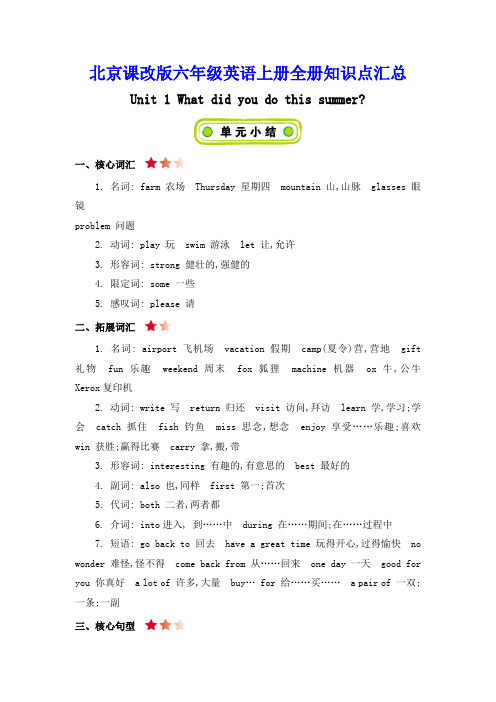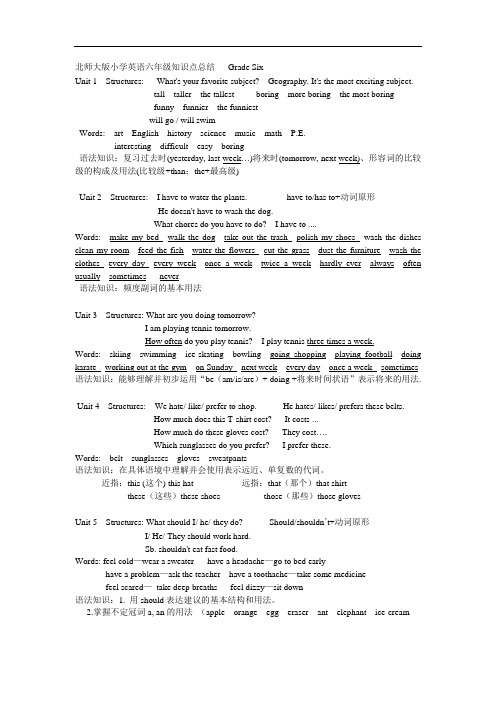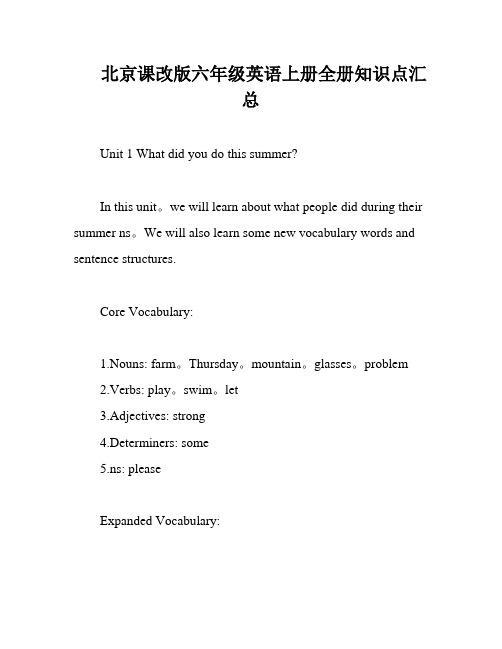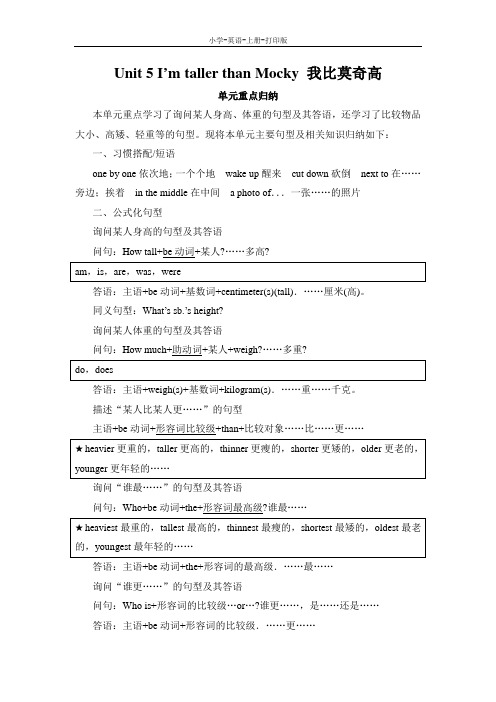北师大版六年级英语上册基础知识梳理(20201226114506)
北京课改版六年级英语上册全册知识点汇总

北京课改版六年级英语上册全册知识点汇总Unit 1 What did you do this summer?一、核心词汇1. 名词: farm 农场Thursday 星期四mountain 山,山脉glasses 眼镜problem 问题2. 动词: play 玩swim 游泳let 让,允许3. 形容词: strong 健壮的,强健的4. 限定词: some 一些5. 感叹词: please 请二、拓展词汇1. 名词: airport 飞机场vacation 假期camp(夏令)营,营地gift 礼物fun 乐趣weekend 周末fox 狐狸machine 机器ox 牛,公牛Xerox复印机2. 动词: write 写return 归还visit 访问,拜访learn 学,学习;学会catch抓住fish 钓鱼miss 思念,想念enjoy 享受……乐趣;喜欢win 获胜;赢得比赛carry 拿,搬,带3. 形容词: interesting 有趣的,有意思的best 最好的4. 副词: also 也,同样first 第一;首次5. 代词: both 二者,两者都6. 介词: into进入, 到……中during 在……期间;在……过程中7. 短语: go back to 回去have a great time 玩得开心,过得愉快no wonder 难怪,怪不得come back from 从……回来one day 一天good for you 你真好 a lot of 许多,大量buy… for 给……买…… a pair of 一双;一条;一副三、核心句型1. — What did you do this summer? 你今年夏天干什么了?— Oh, I went back to Canada. 噢,我回加拿大了。
解读:这是询问某人做过什么的句型及其回答,是 what 引导的一般过去时的特殊疑问句。
(完整版)北师大版小学英语六年级知识点总结.doc

北 大版小学英 六年 知 点 Grade SixUnit 1 Structures:What's your favorite subject? Geography. It's the most exciting subject.tall tallerthe tallestboringmore boringthe most boringfunny funnier the funniestwill go / will swimWords: art English historyscience music math P.E.interesting difficulteasy boring法知 :复 去 (yesterday, last week ⋯)将来 (tomorrow, next week) 、形容 的比的构成及用法(比 +than ; the+最高 )Unit 2 Structures: I have to water the plants.have to/has to+ 原形He doesn't have to wash the dog.What chores do you have to do?I have to ....Words: make my bed walk the dog take out the trash polish my shoes wash the dishes clean my room feed the fish water the flowers cut the grass dust the furniture wash the clothes every day every week once a week twice a week hardly ever always often usually sometimes never法知 : 度副 的基本用法Unit 3 Words:karate Structures: What are you doing tomorrow?I am playing tennis tomorrow. How often do you play tennis?I play tennis three times a week.skiing swimmingice-skatingbowlinggoing shopping playing football doingworking out at the gym on Sunday next week every day once a week sometimes 法知 :能 理解并初步运用“be ( am/is/are )+ doing + 将来 状 ”表示将来的用法.Unit 4 Structures: We hate/ like/ prefer to shop.How much does this T-shirt cost? How much do these gloves cost?Which sunglasses do you prefer?He hates/ likes/ prefers these belts.It costs ...They cost ⋯.I prefer these.Words:belt sunglasses gloves sweatpants 法知 :在具体 境中理解并会使用表示 近、 复数的代 。
最新北师大版小学英语六年级知识点总结

北师大版小学英语六年级知识点总结Grade SixUnit 1 Structures: What's your favorite subject? Geography. It's the most exciting subject.tall taller the tallest boring more boring the most boringfunny funnier the funniestwill go / will swimWords: art English history science music math P.E.interesting difficult easy boring语法知识:复习过去时(yesterday, last week…)将来时(tomorrow, next week)、形容词的比较级的构成及用法(比较级+than;the+最高级)Unit 2 Structures: I have to water the plants. have to/has to+动词原形He doesn't have to wash the dog.What chores do you have to do? I have to ....Words: make my bed walk the dog take out the trash polish my shoes wash the dishes clean my room feed the fish water the flowers cut the grass dust the furniture wash the clothes every day every week once a week twice a week hardly ever always often usually sometimes never语法知识:频度副词的基本用法Unit 3 Structures: What are you doing tomorrow?I am playing tennis tomorrow.How often do you play tennis? I play tennis three times a week.Words: skiing swimming ice-skating bowling going shopping playing football doing karate working out at the gym on Sunday next week every day once a week sometimes 语法知识:能够理解并初步运用“be(am/is/are)+ doing +将来时间状语”表示将来的用法.Unit 4 Structures: We hate/ like/ prefer to shop. He hates/ likes/ prefers these belts.How much does this T-shirt cost? It costs ...How much do these gloves cost? They cost….Which sunglasses do you prefer? I prefer these.Words: belt sunglasses gloves sweatpants语法知识:在具体语境中理解并会使用表示远近、单复数的代词。
北京版小学六年级英语(上册)知识点全表

词汇:交通工具词汇;动词过去式(规则和不规则变化)
句型:
G5U2
What did you do yesterday?
I watched TV.
G4U10
How do you go to school?
I go by bus.
词汇:miss(错过),flight, passport, hotel, fantastic, silk, subway,bridge, sound, special,the Spring Festival Fair, invent, vehicles, smart,invention
What did you say?
I said you should stop eating too much.
stand on your head, practicekung fu, cry, fell down, go to hospital, cut finger, hurt, broke, scratched, eating too much, playing computer games, smoking
Unit 6
What is he wearing?
Clothes
Talking about people’s wearing
What is he wearing?
He is wearing a blue suit with a silver tie.
What does she wear on stage?
句型:
Who invented those vehicles?
Some smart people did.
本单元话题非常贴近学生生活实际,鼓励学生进行真实的表达与交流。
北师大版六年级英语上册复习总结.doc

Unit 1重点单词:geography(地理) science(科学) music(音乐) English(英语)history(历史) math(数学) art(美术)反义词:big(大的)- small(小的);girl(女孩)-boy(男孩);young(年轻的) -old(年老的)thin(瘦的)-fat(胖的);long(长的)-short(短的);easy(容易的)-difficult(困难的)cheap(便宜的)-expensive(昂贵的);fast(快的)-slow(慢的);cold(冷的)-hot(热的)boring(无聊的)-interesting(有趣的)重点句型:①What’s your favorite subject?(你最喜欢哪门学科?)b ecause(因为)I like art,because art is easy.(我喜欢美术,因为美术很容易。
)I don’t like math, math is boring.(我不喜欢数学,数学很无聊。
)② What teacher do you like?(你最喜欢哪位老师)I like Mr Green , He is funny.(我喜欢MrGreen,他很有趣)题型:What subject do you like?What subject do you dislike(不喜欢)?What teacher do you like?Give you reasons(理由).你喜欢哪门学科?你不喜欢哪门学科?你喜欢哪位老师,说出理由.语法知识:动词的时态变化的标志词①过去式— Yesterday(昨天);Last(上一个);ago(以前)动词用过去式,加ed 或不规则的过去式。
②现在时— Today(今天)usually(通常)用动词原形现在进行时—— now(现在)动词后+ing③将来时— tomorrow(明天);next(下一个);maybe(也许,可能)动词前面加will(将要)不规则动词过去式:go(去)-went; see(看见)-saw; eat(吃)-ate;have(有) –had;live(居住)-lived;swim(游泳)-swam;are-were;is/am-was根据实际情况填空,写几句话。
北京版六年级英语上册重点总结

北京版六年级英语上册重点总结第一篇:北京版六年级英语上册重点总结六年级英语上册学习重点(单元句型和单词)谁最棒,比比看!Unit1 句子:1.What did you do this summer? 今年夏天你干什么了? I went back to Canada.我回到加拿大。
2.When did you come back?你什么时候回来了? I came back last Thursday.我上周四回来了。
3.Did you go to see your grandparents?你看望爷爷奶奶了吗?Yes, I did./ No, I didn’t.是的。
看望了。
/没有。
短语:Wrote a story 写故事went back to Canada 回到加拿大 made cakes 做蛋糕came back 回来went to the airport 去机场finished the piano lessons 完成钢琴课 return the books 还书win the football match 赢得足球赛Unit2 句子:4.Why did you stand on your head?你为什么倒立呢? Because I wanted to practice kung fu.因为我想练习功夫。
5.What happened to you?你怎么了? I hurt my right leg.我伤了右腿。
6.What did you say?你说什么了?I said you should stop eating too much.我说你应该少吃点儿。
短语:Stand on your head 倒立practice kung fu练习功夫 go to hospital去医院cut my finger 切伤了手指 fell 摔倒cry 哭hurt 受伤broke 折断scratched抓伤eating too much 吃的太多playing computer games 玩电脑游戏smoking 抽烟Unit3 句子:7.Where did you go last weekend? 上周末你去哪里了?We flew to Hangzhou.我飞到了杭州。
(完整版)北师大版六年级英语上册复习总结

Unit 1重点单词:geography(地理) science(科学) music(音乐) English(英语)history(历史) math(数学) art(美术)反义词:big(大的)- small(小的);girl(女孩)-boy(男孩);young(年轻的) -old(年老的)thin(瘦的)-fat(胖的);long(长的)-short(短的);easy(容易的)-difficult(困难的)cheap(便宜的)-expensive(昂贵的);fast(快的)-slow(慢的);cold(冷的)-hot(热的)boring(无聊的)-interesting(有趣的)重点句型:①What’s your favorite subject?(你最喜欢哪门学科?)b ecause(因为)I like art,because art is easy.(我喜欢美术,因为美术很容易。
)I don’t like math, math is boring.(我不喜欢数学,数学很无聊。
)② What teacher do you like?(你最喜欢哪位老师)I like Mr Green , He is funny.(我喜欢MrGreen,他很有趣)题型:What subject do you like?What subject do you dislike(不喜欢)?What teacher do you like?Give you reasons(理由).你喜欢哪门学科?你不喜欢哪门学科?你喜欢哪位老师,说出理由.语法知识:动词的时态变化的标志词①过去式— Yesterday(昨天);Last(上一个);ago(以前)动词用过去式,加ed 或不规则的过去式。
②现在时— Today(今天)usually(通常)用动词原形现在进行时—— now(现在)动词后+ing③将来时— tomorrow(明天);next(下一个);maybe(也许,可能)动词前面加will(将要)不规则动词过去式:go(去)-went; see(看见)-saw; eat(吃)-ate;have(有) –had;live(居住)-lived;swim(游泳)-swam;are-were;is/am-was根据实际情况填空,写几句话。
六年级英语上册知识点归纳北师大版

六年级英语上册知识点归纳北师大版一、单词1. 动词•be(是)•have(有)•do(做)•go(去)•see(看到)•play(玩)•like(喜欢)•want(想要)•eat(吃)•drink(喝)•sleep(睡觉)•read(读)•write(写)•listen(听)•speak(说)2. 名词•book(书)•pencil(铅笔)•ruler(尺子)•eraser(橡皮)•bag(书包)•desk(桌子)•chair(椅子)•school(学校)•friend(朋友)•teacher(老师)•student(学生)•parent(家长)•brother(兄弟)•sister(姐妹)•cat(猫)•dog(狗)•bird(鸟)•apple(苹果)•banana(香蕉)•orange(橙子)3. 形容词•big(大)•small(小)•short(矮)•long(长)•short(短)•happy(快乐)•sad(伤心)•funny(有趣的)•boring(无聊的)•difficult(困难的)•easy(容易的)•beautiful(美丽的)•ugly(丑陋的)•old(老的)•young(年轻的)二、句型1. be动词句型•I am a student.(我是一个学生。
)•He is my brother.(他是我的兄弟。
)•She is a teacher.(她是一名教师。
)•They are my friends.(他们是我的朋友。
)2. have句型•We have a bag.(我们有一个书包。
)•She has a book.(她有一本书。
)•He has two pencils.(他有两支铅笔。
)•They have a pet.(他们有一只宠物。
)3. 动词原形句型•I like to play basketball.(我喜欢打篮球。
)•She wants to eat an apple.(她想吃一个苹果。
北师大版六年级英语上册基础知识梳理

六年级英语上册基础知识梳理Unit 1 Space第一关:重点单词课本P86 Unit 1的所有单词。
第二关:重点词组第三关:重点句型1.Where were you yesterday? 昨天你/你们在哪儿?I was/We were in a spaceship.我/我们在宇宙飞船里。
2.Where was he/she yesterday? 昨天他/她在哪儿?He/She was in a spaceship? 他/她在宇宙飞船里。
had a dream. 做了个梦。
3.I/ You/He/She/We/They had an English class.上一节英语课。
我/你他/她/他们had a great time.玩得很开心。
4.There were no trees. 没有树。
5.There was no air/water.没有水/空气。
6.I had a dream last night.昨晚我做了个梦。
7.Ken was in my dream. Ken在我的梦里。
8.It was cold on Mars. 火星上很冷。
9.The Martians were very friendly. 火星人很友好。
10.Where are you from? 你们来自哪里?We are from the Earth.我们来自地球。
11.We had a great/good time together.我们在一起玩得很开心。
12.Where were you last mouth?上个月你在哪儿?I was on Mars.我在火星上。
13.Where were you yesterday afternoon?昨天下午你在哪儿?I was at the swimming pool.我在游泳池。
第四关:写作My dreamI had a dream last night. Ken was in my dream. We were in a spaceship and then we were on Mars. It was very cold on Mars. There were no trees. There were no air. There were no water. But there were Martions. The Martions were very friendly. We had a good time.Unit 2 An Accident第一关:重点单词课本P86 Unit 2的所有单词。
最新北师大版六年级英语上册复习总结

最新北师大版六年级英语上册复习总结重点单词:geography(地理) science(科学) music(音乐) English(英语)history(历史) math(数学) art(美术)反义词:big(大的)- small(小的);girl(女孩)-boy(男孩);young(年轻的) -old(年老的)thin(瘦的)-fat(胖的);long(长的)-short(短的);easy(容易的)-difficult(困难的)cheap(便宜的)-expensive(昂贵的);fast(快的)-slow(慢的);cold(冷的)-hot(热的)boring(无聊的)-interesting(有趣的)重点句型:①What’s your favorite subject?(你最喜欢哪门学科?)b ecause(因为)I like art,because art is easy.(我喜欢美术,因为美术很容易.)I don’t like math, math is boring.(我不喜欢数学,数学很无聊.)② What teacher do you like?(你最喜欢哪位老师)I like Mr Green , He is funny.(我喜欢MrGreen,他很有趣)题型:What subject do you like?What subject do you dislike(不喜欢)?What teacher do you like?Give you reasons(理由).你喜欢哪门学科?你不喜欢哪门学科?你喜欢哪位老师,说出理由.语法知识:动词的时态变化的标志词①过去式— Yesterday(昨天);Last(上一个);ago(以前)动词用过去式,加ed 或不规则的过去式.②现在时— Today(今天)usually(通常)用动词原形现在进行时—— now(现在)动词后+ing③将来时— tomorrow(明天);next(下一个);maybe(也许,可能)动词前面加will(将要)不规则动词过去式:go(去)-went; see(看见)-saw; eat(吃)-ate;have(有) –had;live(居住)-lived;swim(游泳)-swam;are-were;is/am-was根据实际情况填空,写几句话.What subjects do you like? What subjects do you dislike (不喜欢) ? Which teacher do you like ? Give your reasons(理由).Hello,My name is ,I study many subjects in shool. My favorite subject is ,because subject is the most ,I like teacher,Because teacher is the most .动词过去式变化规则:①一般情况词尾+ed;②以e结尾+d;③重读闭音节,最后只有一个辅音字母结尾,双写尾音+ed;④以y结尾,变y为i +ed.形容词比较级和最高级的变化规则①短音节(5个字母一下包括5个)②多音节(5个字母以上)形容词比较级最高级的变化比较级在单词前加 more 如 more expensive(更昂贵的)最高级在单词前加 the most 如 the most expensive(最昂贵的)Unit2重点单词短语:have to,has to(不得不,必须);don’t have to ,doesn’t have to,(不必做)make my bed(铺床);walk the dog(遛狗);take out the trash(倒垃圾);polish my shoes(刷鞋)wash the dishes(洗盘子)clean my room(打扫房间);feed the fish(喂鱼); cut the grass(割草)water the plants(浇植物)every day(每天);every week(每周);once a week(每周一次);never(从不)twice a week(一周两次);always(总是);usually(通常的);hardly ever(几乎不);重点句型:① What chores do you have to do?(你不得不做什么家务?)② I have to help Mom.(我必须帮助我妈妈.)I do n’t have to feed the fish.(我不用喂鱼.)第三人称he后面用hasHe has to wash the windows.(他不得不擦洗窗户.)She doesn’t have to walk the dog.(她不必遛狗.)语法总结:1.have to和has to的区别,has 是have的第三人称单数的形式;2. hardly ever 和never的区分,hardly ever(几乎不),never(从不);3. make 和do 的用法,make: make the bed(铺床),make friend(交朋友),make breakfast(做早饭),make telephone call(打电话),make a cake(做蛋糕);do:do homework(做作业);do chores(做家务);do practice(做练习)do karate(空手道)题型:What chores do you have to do?(你不得不做什么家务活?)What chores do you parents have to do?(你的父母不得不做什么家务活?)I have to make my bed.(我必须整理床铺.) My parents have to clean the room. (我的父母必须打扫房间.)Unit3重点单词: be +doing+将来时间状语表示将来;动词ing 表示将来= will(将要)Activity(活动):skiing(滑雪)ice-skating(滑冰)doing karate(空手道)swimming(游泳)bowling(保龄球)going shopping(去购物)playing football(踢足球) working out at the gym(在健身房健身)How often(隔多久):Saturday(周六)on Sunday(在周日)next week(下周)every day(每天)sometimes(有时候)once a week(每周一次)重点句型:1. What are you doing tomorrow?(你明天将要干什么?)2. I am playing tennis tomorrow. (我明天将要打网球.)3. How often do you play tennis? (你多久打一次网球?)语法:1.表示将来的时间词:tomorrow(明天)next(下一个)next week(下周)next month(下个月)next year(明年)2.现在进行时+将来时间状语表示将来3.人称+will+动词原形也表示将来Unit 4重点词汇:prefer(更喜欢)this(这个)that(那个)thses(这些)those(那些)单数:belt(皮带)cap(帽子)shirt(衬衫)bag(书包)复数:sweatpants(宽松的运动裤),socks(袜子),shoes(鞋),shorts(短裤),gloves(手套),glasses(太阳镜). jeans(牛仔裤)重点句型:单数动词后用加s或es,复数用动词原形①Which sunglasses do you prefer?(你更喜欢哪幅太阳镜?)② I like to shop.(我喜欢去购物.)He likes these belt.(他更喜欢这些皮带.) ③We hate shopping.(我讨厌购物.) She hates shopping.(她讨厌购物.)④ You prefer this belt.(你更喜欢这条皮带.) He prefers this belt.(他更喜欢这条皮带)⑤单数用does 复数用doHow much does this/that T-shirt cost?(这条/那条皮带多少钱?)How much do these/those sunglasses cost?(这些/那些太阳镜多少钱?) 语法知识:1.2. prefer 更喜欢,用于两者之间进行比较时使用;如Between music and art,I prefer .(在音乐和美术之间,我更喜欢 .)3. spend和cost的区别:spend的主语为人称,如:I spend only $20 to spend.(我只有20美元能花.)cost的主语为物品,如: This belt costs $5.(这条皮带值五美元.)4. Buying gifts for people isn’t easy. (为别人买礼物不是件容易的事.)Buying为动名词,+ing.Unit 5重点单词: should(应该)shouldn’t(不应该)problem(问题)advice(建议)①计算机名词:printer(打印机) speakers(音响) CD(光盘) disk(磁盘)screen(显示器) hard disk(硬盘) mouse(鼠标) keyboard(键盘)②表情类词汇:sad(伤心的) cold(冷的) scared(吃惊的) happy(高兴的)hungry(饥饿的) angry(生气的) worried(担心的)tired(疲倦的) bored(无聊的) hot(热的)重点句型:① What should I do?(我应该怎么做?)② You should ask first.(你应该先问问.)③ We shouldn’t eat fast food.(我们不应该吃快餐.)问题及建议:Problem(问题) Advice(建议)①I feel cold today(我今天感觉很冷.) wear a sweater(穿毛衣)② I have a headache (我头疼) take some medicine(吃点药)③ I’m tired(我很累) go to bed early(早点休息)④ I have a problem(我有一个问题) tell your parents(告诉你的父母)⑤ I feel dizzy(我感到头晕) sit down(坐一会)⑥ I have a toothache(我牙疼) visit the dentist(看牙医)⑦ I feel scared (我很吃惊) take deep breaths(深呼吸)⑧ I forgot my pen(我忘带笔了) borrow one from a friend(和朋友借一个)⑨ My sister is angry with me(我姐姐生我气了) say sorry to her(对她说对不起)⑩ I don’t like the dark(我不喜欢黑) turn on the light(开灯)⑾ I see an accident(我看见了意外事故) call the police(给警察打电话)。
六年级上北京版知识点知识讲解

Lesson 1一、动词及过去式look-looked learn-learned work-worked read-readstay-stayed play-played go-went write-wrotedo-did visit-visited have/has-had make-made二、重点词组went back to Canada回加拿大了had a great time过的愉快did many things做了许多事情visited my grandparents看望我爷爷奶奶played with my friends 和我的朋友玩just stayed in Beijing待在北京Worked on my uncle’s farm在我叔叔的农场劳动went swimming去游泳learned to sing Peking Opera学唱京剧visited some museums参观一些博物馆played with my cousins和我的堂兄弟姐妹玩had an interesting vacation度过了一个有意思的假期三、重点句型What did you do this summer?I went back to Canada.What did Lanlan do this summer?She wrote a story.What did Qiangqiang do this summer?He made cakes.四、我会说I went to Niantan park .I had a great time ,and did many things.I went to the beach. I played with my friends .I had an interesting vacation. Lesson 2一、动词及过去式不规则:(1)do—did (2)come—came (3)swim—swam (4)go—went(5)catch—caught(6)let—let (7)am/is—was (8)are—were(9)take—took (10)have/has—had规则:(1)climb—climbed二、重点词组(1)come back (2)summer camp (3)last Thursday (4)climbed themountains 回来夏令营上周四爬山(5)swam in the river (6)went fishing (7)caught three fish在河里游泳去钓鱼抓了三条鱼(8)good for you (9)had a lot of fun你真好过的非常快乐三、重点句型When did you come back? When did she finish the piano lesson?I came back last Thursday. She finished piano lessons last week.When did he go to the airport?He went to the airport last Monday morning.四、我会说My parents and I took a trip last weekend..I flew to Hangzhou. We went there by airWe visited many places and saw green hills, blue water, small bridges, and old houses.We came back last weekend.Today I was happy.Today we had a lot of fun.Lesson 31.动词及过去式do—didbuy—boughtgive—gavelike—liked2.重点句型Did you go to see your grandparents?Yes, I did./No, I didn’t.Did you return the books?Yes, I did./No, I didn’t.Did they win the football match?Yes, I did./No, I didn’t.3 .重点词组a pair of Chinese shoes a pair of glassesSure, what can I do for you? No problem.4.我会说My parent and I went to Xiangshan by car last weekend. We saw a lot of colourful leaves on the hills. We walked around and took many photos. We stayed there for three hours and went back home.Lesson5一、重点单词wrong aches terribly practice kung fu有问题的疼很非常练习功夫Interested lucky dangerous X-ray neck对…感兴趣幸运危险的X-射线脖子二、动词及其过去式happen-happened stand-stood do-did want-wanted 发生站立做想要think-thought is-was hurt-hurt don‘t-didn’t认为,想是受伤没有,不是isn’t -wasn’t不是三、重点词组My neck aches terribly practice kung fu be interested in 脖子疼的厉害练习中国功夫对----感兴趣四、重点句子1. What’s wrong with you? 你怎么了?2. What’s happened to your neck? 你的脖子怎么了?3. I’m very interested in it. 我对这个非常感兴趣。
北京课改版六年级英语上册全册知识点汇总

北京课改版六年级英语上册全册知识点汇总Unit 1 What did you do this summer?In this unit。
we will learn about what people did during their summer ns。
We will also learn some new vocabulary words and sentence structures.Core Vocabulary:1.Nouns: farm。
Thursday。
mountain。
glasses。
problem2.Verbs: play。
swim。
let3.Adjectives: strong4.Determiners: some5.ns: pleaseExpanded Vocabulary:1.Nouns: airport。
n。
camp。
gift。
fun。
weekend。
fox。
machine。
ox。
Xerox2.Verbs: write。
return。
visit。
learn。
catch。
fish。
miss。
enjoy。
win。
carry3.Adjectives: interesting。
best4.Adverbs: also。
first5.Pronouns: both6.ns: into。
during7.Phrases: go back to。
have a great time。
no wonder。
come back from。
one day。
good for you。
a lot of。
buy for。
a pair ofCore Sentence Structures:1."What did you do this summer?" - This is a common n to ask about someone's summer activities。
It is a special interrogative sentence in the past tense.Example: "Oh。
北师大版六年级(上)英语复习提纲

北师大版六年级(上)英语复习提纲Unit 1一、单词(words)1. boring 乏味的,无聊的2. classmate 同班同学3. club 俱乐部4. drawing 绘画,素描,图画5. easy 简单的,容易的6. funny 有趣的,滑稽的7. history 历史,历史学8. kid 小孩9. live 住,居住10. painting 绘画,油画11. subject 学科12. esp e cially 特别地,尤其13. experiment 实验,试验14. geography 地理学15. introduce 介绍16. maybe 或许,可能17. neighbor 邻居18. neighborhood 近邻,街坊19. really 真正地,确实20. themsel ves他们(她们,它们)自己二、复习有关课程的单词1.art 艺术、美术课2.English 英语课3.science 科学4. music 音乐5. math 数学6. P. E. 体育7. Chinese 语文8. geography 地理9. history 历史10.physics 物理(不要求)11.chemistry 化学(不要求)三、短语1. favorite subject 最喜欢的学科the most difficult subject 最困难的学科the most boring subject 最无趣的学科2.talk about …谈论e.g. They are talking about their favorite subjects.3. have fun 玩得开心have fun with 做…很开心,和…玩得开心,愉快参与到…中e.g. The BINGO kids are having fun.You can have fun with your kid.You'll have a lot of fun with the creation stories.你能从读创世纪故事中获得快乐.We’ll have lots of fun together.4. want sb. to do …要某人做某事want sb. to …要某人去某地e.g. BINGO kids want Ann and Ken to join their club.Charlie’s mom want him to school on Saturday.5. older brother 哥哥younger brother 弟弟fat(fatter fattest) wet(wetter wettest) (4).以“辅音字母+y”结尾的形容词,将y变为i,加-er构成比较级,加-est构成最高级funny(funnier funniest)(5).其它双音节和多音节形容词,前面加more 构成比较级,前面加the most构成最高级interesting boring exciting difficult4.能够分清英语单词的词性名词noun n.代词pronoun pron.动词verb v.形容词adjective adj.副词adverb adv.5. 复习动词的单、复数形式和用法(1). 一般情况加-sread write work come(2). 以[s] [ʃ] [tʃ]音素结尾或以字母-o结尾的动词,加-espass(passes) push(pushes)watch(watches)do(does) go(goes) (3). 以“辅音字母+y”结尾的动词,亦y为i,再加-es Study(studies) try(tries) fly(flies) apply(applies) Unit 2一、单词1. busy 忙碌的2. chore 家务3. do chores 做家务4. dish 盘子5. dust 掸去,刷去(灰尘)6. feed 喂(养),饲(养)7. feel 感觉,感受8. grass 草9. homework 家庭作业10. once 一次,一回11. twice 两次,两回12. once ( twice) a week每周一次(两次)13. plant 植物14. polish 擦(鞋),刷(鞋)15. street 街道16. tell 告诉17. think 认为,以为18. trash 垃圾19. furniture 家具20. never 从不,决不21. person 人二、短语1. make the (my) bed 铺床2. clean the(my) room 打扫房间3. walk the dog 遛狗4. every week(day)每周(天)5. every morning 每天早晨6. on Sundays 在星期天7. want to do ... 想要做某事8. next day 第二天9. hardly ever 很少,几乎不10. before school 上学前11. do homework 做家庭作业12. do chores 做家务13. wash the dishes 洗盘子14. feed the fishes 喂鱼15. cut glass 割草16. water the plants 给植物浇水17. polish the shoes 擦鞋18. take out the trash 倒垃圾三、重点句型1.询问某人必须做某事及回答问:What (chores/works) + do/does + 代/名词+ have to do?答:代/名词+have/has to…..e.g.What chores do you have to do?I have to make my bed every day.What chores dose he have to do?He has to feed the fishes every day.2、否定句(不必)don’t / doesn’t +have toe.g. I don’t have to feed the fishes every day.He doesn’t have to water the plants every week.四、语音掌握字母y在单词结尾(辅音字母+y)的发音[i];easy dirty juicy tiny noisy sleepy五、语法1.频度副词的基本用法:副词+动词:always,usually,often,sometimes,hardly ever,never句子最后:once/twice a week/month/year,on Sundays/Mondays/。
六年级上北京版知识点.doc

六年级上北京版知识点一、动词及过去式六年级上北京版知识点stay-stayed play-played go-went write-wrotedo-did visit-visited have/has-had make-made二、重点词组went back to Canada 回加拿大了had a great time 过的愉快did many things 做了许多事情visited my grandparents 看望我爷爷奶奶played with my friends 和我的朋友玩just stayed in Beijing 待在北京Worked on my uncle ’farms 在我叔叔的农场劳动went swimming 去游泳 learned to sing Peking Opera 学唱京剧visited some museums 参观一些博物馆played with my cousins 和我的堂兄弟姐妹玩had an interesting vacation度过了一个有意思的假期三、重点句型What did you do this summer?I went back to Canada.What did Lanlan do this summer?She wrote a story.What did Qiangqiang do this summer?He made cakes.四、我会说I went to Niantan park .I had a great time ,and did many things.I went to the beach. I played with my friends .I had an interesting vacation.Lesson 2一、动词及过去式不规则:( 1) do—— came(3)swim —swam(4)go —went(5)catch —caught(6)let —let(7)am/is—was(8)are —were(9)take — took(10)have /has — had规则:( 1)climb — climbed二、重点词组回来夏令营上周四爬山(5)swam in the river(6)went fishing(7)caught three fish在河里游泳去钓鱼抓了三条鱼(8)good for you(9)had a lot of fun你真好过的非常快乐三、重点句型I came back last Thursday.She finished piano lessons last week.When did he go to the airport?He went to the airport last Monday morning.四、我会My parents and I took a trip last weekend..I flew to Hangzhou. We went there by airWe visited many places and saw green hills, blue water, small bridges, and old houses. We came back last weekend.Today I was happy.Today we had a lot of fun.Lesson 31.及去式do —didbuy —boughtgive —gavelike —liked2.重点句型Did you go to see your grandparents?Yes, I did./No, I didn’ t.Did you return the books?Yes, I did./No, I didn’ t.Did they win the football match?Yes, I did./No, I didn’ t.3 .重点a pair of Chinese shoes a pair of glassesSure, what can I do for you?No problem.4.我会My parent and I went to Xiangshan by car last weekend. We saw a lot of colourful leaves on the hills. We walked around and took many photos. We stayed there for three hours and went back home.Lesson5一、重点wrong aches terribly practice kung fu有的疼很非常功夫Interested lucky dangerous X-ray neck⋯感趣幸运危的X-射脖子二、及其去式happen-happened stand-stood do-did want-wanted 发生站立做想要think-thought is-was hurt- hurt don‘t-didn ’t认为 ,想是受伤没有 ,不是isn ’-wasnt’t不是三、重点词组My neck aches terribly practice kung fu be interested in 脖子疼的厉害练习中国功夫对---- 感兴趣四、重点句子1. What ’ s wrong with you? 你怎么了?2. What ’ shappened to your neck? 你的脖子怎么了?3. I ’ mvery interested in it. 我对这个非常感兴趣。
六年级英语上册各单元重点知识点北京版

六年级英语上册各单元重点知识点北京版第一单元:认识新朋友- 研究自我介绍语句,如"My name is [name]. I am [age] years old. Nice to meet you."- 研究简单的问候语,如"Hello! How are you? I'm fine, thank you."- 研究数字1-20的读法和写法。
第二单元:我和我的家- 学会用英语表达家庭成员。
如:爸爸、妈妈、哥哥、姐姐、弟弟、妹妹等。
- 研究用英语表达家庭成员的职业。
如:My father is a teacher. My mother is a doctor.第三单元:学校生活- 研究关于学校设施的词汇,如:classroom、library、gym、playground等。
- 研究表达日常活动,如:go to school, have classes, play games 等。
第四单元:我的身体- 研究身体部位的词汇,如:head、shoulders、knees、toes等。
- 研究描述身体状况的词汇,如:I have a headache. I feel tired.第五单元:节日活动- 研究关于节日的词汇,如:Christmas、Easter、Halloween等。
- 研究描述节日活动的词汇,如:decorate, give presents等。
第六单元:我们的家园- 研究关于环境保护的词汇,如:pollution、recycling、plant trees等。
- 研究描述环保行为的词汇,如:save energy, reduce waste等。
第七单元:我们的世界- 研究国家和国旗的词汇,如:China、Australia、USA等。
- 研究询问和回答国籍的句型,如:Where are you from? I am from China.第八单元:时间和天气- 研究描述天气的词汇,如:sunny、cloudy、rainy等。
北京版小学六年级英语(上册)知识点全表

No wonder you look stronger. It took only two hours by bus.
三个学习课“Let’s do”板块均是“听和写”相结合的教学。在“写”之前要进行充分的口语表达,最后进行书写练习。
Lesson 4 “Now I can read”板块是转述对话而成的短文。第一段转述的是Mike暑期的生活。结合Lesson 1,Lesson 3两课的对话内容。对于学有余力的学生可以写一篇玲玲暑假生活的短文。
the ancient Olympic Games, the Qin Dynasty, Athens776BC, 618AD, buy, borrow, gold/ silver/ bronze medals
bl, blue, black,
br, bright, break, bright
cl, class, clean, climb
Y, year, yellow baby, lucky stay, play by, fly, sky
词汇:身体部位词汇;动词过去式(规则和不规则变化)
句型:
G3U11
How are you today?
What’s the matter?
My head/ leg/ mouth hurts.
词汇:stand on your head, ache, terribly,kung fu, a blood test, scratch, upset, pill, stop doing
What did you do this summer?
I went back to Canada.
When did you come back?
I came back last Thursday.
北师版-英语-六年级上册-英语北师版(三起)六年级上 Unit 5 单元重点归纳

Unit 5 I’m taller than Mocky 我比莫奇高
单元重点归纳
本单元重点学习了询问某人身高、体重的句型及其答语,还学习了比较物品大小、高矮、轻重等的句型。
现将本单元主要句型及相关知识归纳如下:
一、习惯搭配/短语
one by one依次地;一个个地wake up醒来cut down砍倒next to在……旁边;挨着in the middle在中间 a photo of...一张……的照片
二、公式化句型
询问某人身高的句型及其答语
问句:How tall+be动词+某人?……多高?
答语:主语+be动词+基数词+centimeter(s)(tall).……厘米(高)。
同义句型:What’s sb.’s height?
询问某人体重的句型及其答语
问句:How much+助动词+某人+weigh?……多重?
答语:主语+weigh(s)+基数词+kilogram(s).……重……千克。
描述“某人比某人更……”的句型
主语+be动词+形容词比较级+than+比较对象……比……更……
询问“谁最……”的句型及其答语
问句:Who+be动词+the+形容词最高级?谁最……
答语:主语+be动词+the+形容词的最高级.……最……
询问“谁更……”的句型及其答语
问句:Who is+形容词的比较级…or…?谁更……,是……还是……
答语:主语+be动词+形容词的比较级.……更……
(备注:标注★的词汇为教材单词表中的词汇。
)。
北师大英语六年级上册

北师大英语六年级上册一、单词部分。
1. 重点单词汇总。
- 描述人物外貌和性格的单词。
- tall(高的),short(矮的;短的),strong(强壮的),thin(瘦的),kind(和蔼的;友善的),strict(严格的),funny(滑稽的;好笑的)。
例如:My English teacher is kind and strict.(我的英语老师既和蔼又严格。
)- 关于学科的单词。
- English(英语),math(数学),science(科学),art(美术),music (音乐),PE(体育)。
可以用句子I like art best because I like drawing.(我最喜欢美术因为我喜欢画画。
)来练习。
- 表示星期的单词。
- Monday(星期一),Tuesday(星期二),Wednesday(星期三),Thursday (星期四),Friday(星期五),Saturday(星期六),Sunday(星期日)。
如:We have English class on Monday.(我们星期一有英语课。
)2. 单词记忆方法。
- 联想记忆法。
- 对于“science”这个单词,可以联想科学家(scientist),科学就是科学家研究的内容。
- 分类记忆法。
- 把学科类单词放在一起记忆,对比它们的拼写和发音特点。
例如“math”和“art”,一个以“th”发音,一个以“r”发音。
二、语法部分。
1. 一般现在时。
- 用法。
- 表示经常或习惯性的动作或状态。
例如:He often plays football after school.(他放学后经常踢足球。
)- 表示客观事实或普遍真理。
The earth goes around the sun.(地球绕着太阳转。
)- 动词的第三人称单数形式。
- 一般情况下,在动词原形后加 -s,如like - likes;以s,x,ch,sh,o结尾的动词,加 -es,如go - goes,watch - watches;以辅音字母加y结尾的动词,变y为i,再加 -es,如study - studies。
- 1、下载文档前请自行甄别文档内容的完整性,平台不提供额外的编辑、内容补充、找答案等附加服务。
- 2、"仅部分预览"的文档,不可在线预览部分如存在完整性等问题,可反馈申请退款(可完整预览的文档不适用该条件!)。
- 3、如文档侵犯您的权益,请联系客服反馈,我们会尽快为您处理(人工客服工作时间:9:00-18:30)。
六年级英语上册基础知识梳理Unit 1 Space第一关:重点单词课本P86 Unit 1的所有单词。
第二关:重点词组1 in a spaceship 在宇宙飞船里10 in my dream 在我的梦里2 in space 在太空11 Ann’s dream Ann的梦3 on Mars 在火星上12 last night 昨天夜间4 on the moon 在月球上13 last month 上个月5 have a great/good time 玩的开心14 last Saturday 上周六6 have an English class 上一节英语课15 an astronaut 一个宇航员在游泳池7 have classes 上课16 at the swimmingpool8 have a dream 做了个梦17 yesterday afternoon 昨天下午9 swimming pool 游泳池第三关:重点句型1.Where were you yesterday? 昨天你/你们在哪儿?I was/We were in a spaceship.我/我们在宇宙飞船里。
2.Where was he/she yesterday? 昨天他/她在哪儿?He/She was in a spaceship? 他/她在宇宙飞船里。
had a dream. 做了个梦。
3.I/ You/He/She/We/They had an English class.上一节英语课。
我/你他/她/他们had a great time.玩得很开心。
4.There were no trees. 没有树。
5.There was no air/water.没有水/空气。
6.I had a dream last night.昨晚我做了个梦。
7.Ken was in my dream. Ken在我的梦里。
8.It was cold on Mars. 火星上很冷。
9.The Martians were very friendly. 火星人很友好。
10.Where are you from? 你们来自哪里?We are from the Earth.我们来自地球。
11.We had a great/good time together.我们在一起玩得很开心。
12.Where were you last mouth?上个月你在哪儿?I was on Mars.我在火星上。
13.Where were you yesterday afternoon?昨天下午你在哪儿?I was at the swimming pool.我在游泳池。
第四关:写作My dreamI had a dream last night. Ken was in my dream. We were in a spaceship and then we were on Mars. It was very cold on Mars. There were no trees. There were no air. There were no water. But there were Martions. The Martions were very friendly. We had a good time.Unit 2 An Accident第一关:重点单词课本P86 Unit 2的所有单词。
第二关:重点词组1 watch TV 看电视24 see the dinosaur show 看恐龙展2 watch a film 看电影25 wash clothes/the socks 洗衣服/袜子3 help Mom 帮助妈妈26 read books/a book 读书,看书4 go swimming 去游泳27 eat/have breakfast 吃早饭5 go to the cinema 去电影院28 go into the kitchen 进入厨房6 visit a friend 拜访朋友29 look sick 看起来病了7 do(the) homework 做作业30 another one 另一个8 clean the table 清理桌子31 make a mess 搞得一团糟9 clean the room 打扫房间32 eat slowly 吃慢点10 go everywhere 到处,处处33 too quickly 太快了11 last Saturday 上周六34 before dinner 晚饭前12 at school 在学校35 after school/dinner 放学/晚饭后13 at home 在家36 in the evening 在晚上14 go to school 去上学37 in the park 在公园里15 go to bed 上床睡觉38 at the cinema 在电影院16 play football 踢足球39 an old man 一位老人17 play with Peter 和Peter一起40 the dinosaur show 恐龙展玩18 go into 进入41 see a robot show 看机器人展19 come in 进来42 the Science Museum 科学博物馆20 come back 返回43 watch a 4D film 看4D电影21 get up 起床44 play with 和…一起玩22 be careful 小心一点45 on the way 在路上23 next time 下一次第三关:动词及过去式规则动词不规则动词动词原形过去式动词原形过去式visit visited 拜访,看望go went 去,走clean cleaned 打扫,清洁eat ate 吃watch watched 观看,注视do did 做help helped 帮助have had 有want wanted 想要see saw 看见play played 玩make made 制做wash washed 洗give gave 给paint painted 画画take took 带第四关:重点句型1.I/You visited a friend.我/你拜访了朋友。
I/You didn’t visit a friend. 我/你没有拜访朋友。
2.He/She went to school.他/她去上学了。
He/She didn’t go to school. 他/她没有去上学。
3.We/They cleaned the room.我们/他们打扫了房间。
We/They didn’t clean the room. 我们/他们没有打扫房间。
4.What did you do yesterday?昨天你做什么了?I watched a film我看电影了。
5.They weren’t at school.他们不在家。
6.He wasn’t at home.他不在学校。
7.We’re having breakfast.我们正在吃早饭。
8.Mocky went into the kitchen. Mocky进入了厨房。
9.What’s the matter? 发生什么事了?Mocky ate the banana very quickly. Mocky吃香蕉太快了。
10.The banana went everywhere.香蕉喷得到处都是。
11.Ken helped him and Ann cleaned the table. .Ken帮助了他,Ann擦干净了桌子。
12. Be careful next time. 下次小心一点。
13. The next day Mocky visited Ann and Ken again.第二天,Mocky 又来拜访Ann 和Ken.14.Mocky didn’t want any bananas. Mocky不想吃香蕉了。
15.I had/ate breakfast at seven thirty.我7:30吃早饭。
16.I went to school at eight o’clock.我8点钟去上学。
17.After school I painted with Peter.放学后,我和Peter一起画画。
18.I played football at five o’clock.我5点钟踢足球。
19.I washed my clothes before dinner.我晚饭前洗衣服。
20.I did my homework after dinner.我晚饭后做作业。
21.I watched TV at eight in the evening.我晚上8点看电视。
22.I went to bed at ten o’clock.我10点上床睡觉。
第五关:写作Mocky’s Bad DayLast Saturday, Mocky visited Ann and Ken. He went into the kitchen. Mocky washungry. He wanted a banana. Ann passed him one. Mocky ate the banana very quickly. Then he ate another one. Suddenly, Mocky looked sick. He coughed and coughed. The banana went everywhere. Ken helped him and Ann cleaned the table. Mocky was very sorry because he made a mess.My diaryI had breakfastLast Sunday, I didn’t go to school. I was at home. I got up at 8:00.at 8:30. I cleaned my room, but I didn’t cleaned the table. I washed my sockses but Ididn’t do the homework. I watched TV but I didn’t watched a film. I ate appl didn’t ate bananas. I had a great time.Unit 3 Sports第一关:重点单词课本P86 Unit 3的所有单词。
